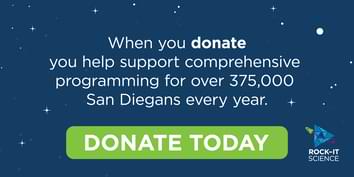Craveology Cafe and the North Star Science Store are temporarily closed for renovation.
Exploring Ethics
Step into the realm of ethical exploration with Exploring Ethics at the Fleet Science Center. Proudly in collaboration with the Science & Technology Ethics Center (STEC), we invite you to engage with scientific discovery through an ethical lens.
Exploring Ethics fosters a dynamic dialogue between the public and scientists, delving into how science and technology can best serve society. Each event provides a platform for audiences to share their thoughts and questions with esteemed guest speakers. These gatherings are designed for those eager to embrace new ideas and embrace viewpoints divergent from their own.
STEC hosts these enlightening events across prestigious institutions like UCSD, SDSU, and right here at the Fleet Science Center.
Catch up on past STEC events in the recording archive.
